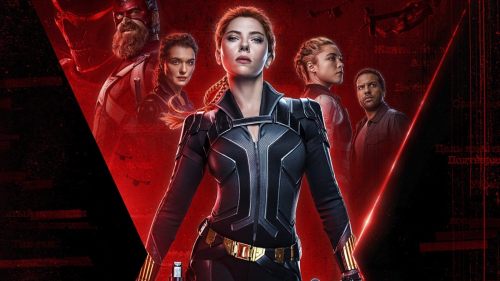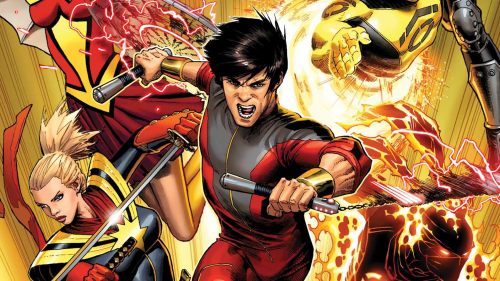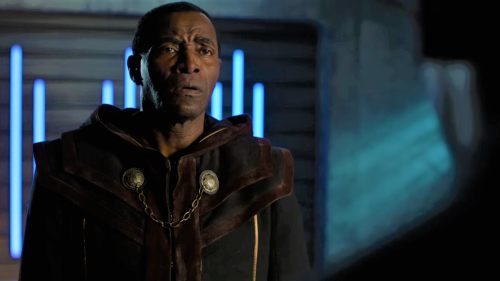BLACK PANTHER Review: Marvel’s Most Ambitious, Visionary Film Ever
After a few years of reaching for the stars, Marvel Studios has come back down to earth. I don’t mean this as some pejorative slight against their ambitions. Rather, it’s a sign that in our culture, you can’t afford not to. The opening sequence of Ryan Coogler’s Black Panther is not a muscular action extravaganza or a mind-bending cosmic adventure. It’s the tense world of urban Oakland, California, in the early 90s; a basketball court occupied by young black males. A mere day removed from the birthday of the late Trayvon Martin, this is a potent reminder of what is at stake, not just in the film, but in our real world. Without ever uttering his name, this movie is dedicated to him and to all the lost boys this nation is content to leave behind.
Movie criticism has reached a point where it’s simply not enough to say whether or not something is good. The thumbs-up-thumbs-down paradigm of Siskel & Ebert feels woefully passé to most cinema observers. What are the sociological implications of a movie? What is the significance of the symbolism? Is the film uplifting the downtrodden or reinforcing stodgy norms? Some will blanch at the modern critic’s invocation of Malcolm X and Martin Luther King, or the nods to Ta-Nehisi Coates, but to do otherwise is to negate the power of film to inspire and to educate. Black Panther is the opening of a door wider than it has ever been — a blockbuster unashamed of its blackness, concerned with the feelings of that audience, but broad enough to let everyone into the party. In that sense, it’s a miracle.
We all know what Chadwick Boseman can do in this role after his star turn in Captain America: Civil War. He ups the ante with his work here, adding a suave James Bond flourish to an extended section that takes place in South Korea. As thrilling as the tribal Wakanda scenes are for those of us aching to see ourselves on screen, it’s in these moments that Boseman and the film really shine. There’s an effortlessness and a playful quality that revs up the proceedings when divorced from the royal formality that sometimes frustrates me. That formal tone also hamstrung the first two Thor movies, though Black Panther benefits from the fact that these tropes are being used in the service of a predominately black cast. Again, to underestimate the cultural good of these images is unwise. The grand throne rooms of Thor are worlds we have seen countless times in movies. I would never denigrate this as novelty, but it is novel.
Opposite T’Challa is Michael B. Jordan is Erik Killmonger, and as is common with these films, the villain offers a moral counterpoint to the hero. Killmonger and T’Challa essentially want the same thing: justice for black folks around the world. How they go about that is the crux of the picture. One can easily draw parallels between these two comic book figures and Martin and Malcolm. Do you demand justice by the sword or by the extension of your hand? This is a very expensive Marvel movie, so you can guess where the morality lies, but the question continues to be asked by black intellectuals and will continue to be asked for years to come.
Jordan is one of the most exciting, dynamic actors working in Hollywood, and he brings a vulnerability and sadness to Killmonger that elevates him above the standard mustache-twirling Marvel baddie. He’s so good at engendering your sympathy that one might yearn for a bit more mustache in his performance, but that would fundamentally alter the film’s affecting final scenes back in Oakland. This is a film comfortable with its complexity, confident in its politics, and unafraid to allude to sometimes-grim truths about race relations. Killmonger’s introduction in particular is a master class in how to both touch on what really matters and satisfy the popcorn urge simultaneously. In a way, he’s the true conscience of the movie and the one who speaks to the collective anxiety of the black man and woman in 2018, while T’Challa and Lupita Nyong’o’s Nakia are our glittering ideal.
Above all, this is a superbly acted movie, stolen without remorse by Letitia Wright’s work as Shuri, T’Challa’s whip-smart sister, who outfits him with all of his vibranium-enhanced tech. Almost every great line or gag comes from her mouth, and she’s guaranteed a big 2018 and 2019 from this performance alone. The ensemble is aided by legendary heavy-hitters like Angela Bassett and Forest Whitaker, plus strong supporting work from Nyong’o and Get Out’s Daniel Kaluuya. Andy Serkis as Ulysses Klaw and Martin Freeman’s Agent Ross will inevitably be referred to as “the white actors” in this movie, but each is vital to its success, portraying the two sides of colonization: the sneering profiteer, and the smiling, unassuming westerner whose intentions might be good, but whose motives aren’t always clear.
Make no mistake, though. Black Panther is not a perfect film. It’s in the upper echelon of Marvel movies, but it remains to be seen if it’s superior to Civil War, the first Iron Man, or Guardians of the Galaxy. The action scenes are fine, but not all that memorable, save for the South Korea car chase in the middle of the movie. For some audiences, its moral quandary could have been more explicit and explored in more depth. The third act does its level best, but fails to instill much doubt or tension. Also, Marvel’s neverending obsession with having their characters put on and take off their masks for no reason continues.
None of that is enough to sink a fun, clever, resonant motion picture. Marvel took a chance on this project - a risk bigger even than the wacky, surreal Guardians. This movie flies in the face of Hollywood’s racist conventional wisdom about what sells and what doesn’t. Thanks to Black Panther, the door is wide open. Now, it’s time for us to step through.



